Impulsively got a fitness card? Many officials have come forward to support you to go back on your word!
On November 5th, Shanghai Consumer Rights Protection Committee, together with Shanghai Sports Bureau, Shanghai Municipal Market Supervision Administration and Shanghai Fitness Association, jointly formulated the Model Text of Shanghai Sports Fitness Industry Member Service Contract (Draft for Comment) (hereinafter referred to as the Model Contract (Draft for Comment)). Among them, the "seven-day cooling-off period refund" clause of the fitness card triggered a heated discussion among netizens.
It is clearly stated in the Model Contract (Draft for Comment): "Consumers can unilaterally terminate the contract and get a full refund within 7 days from the day after signing the contract without opening a card to use the membership service."
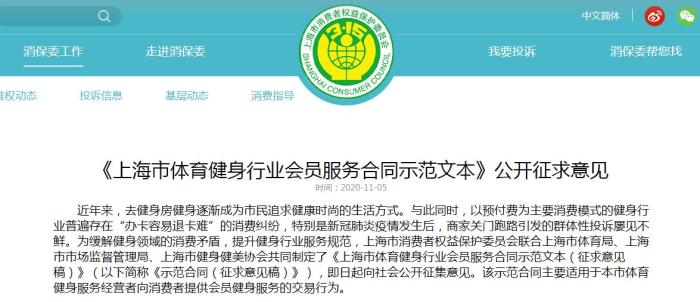
Screenshot of official website of Shanghai Consumer Protection Committee.
With the concept of national fitness deeply rooted in people’s hearts, more and more people have entered the gym. However, because the fitness industry is mainly based on prepaid consumption mode, it also makes the gym the hardest hit area for impulsive consumption.
After spending a lot of money on the card, I have never been to the gym — — Many consumers have had similar troubles. Shanghai suggested that the fitness card should have a 7-day cooling-off period, which can protect the rights and interests of impulsive consumers, avoid the overlord clauses of some unscrupulous merchants and reduce the corresponding complaints and disputes.
However, it is worth mentioning that the "seven-day cooling-off period refund" in Shanghai has the precondition of "not using the card" Once a consumer opens a card to enter the venue, the membership period will start directly, even if it is still within 7 days, it will no longer apply to the cooling-off period refund clause.
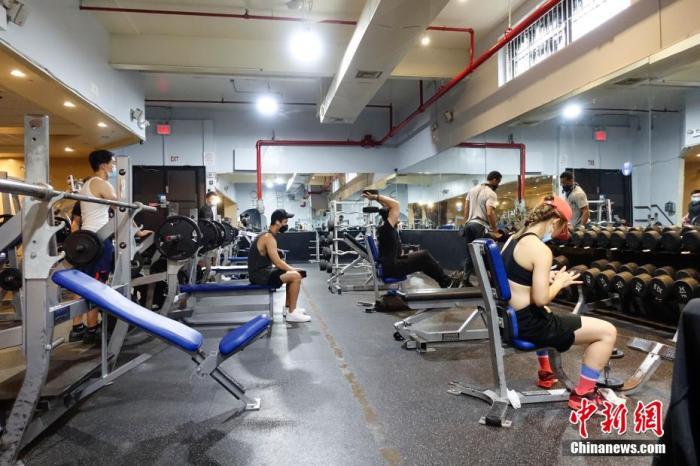
Data Map: On September 2nd, local time, a gym in Queens, new york, USA reopened. China News Service reporter Liao Panshe
In fact, Shanghai is not the first city to propose a "7-day cooling-off period" for fitness cards. On October 22nd, Shenzhen Consumer Council advocated setting a cooling-off period for impulsive consumption in the fitness industry, and advocated that the fitness industry "has no reason to refund the fee if it has not been consumed within seven days after payment".
It is reported that 10 fitness enterprises in Shenzhen actively responded to the call and promised consumers: "Those who do not spend within seven days after payment can get a full refund" and "no bundled sales of private education services".
There is no doubt that the "7-day cooling-off period" gives consumers a buffer period, and the fitness card that is handled on impulse will no longer have to be practiced on the knees.
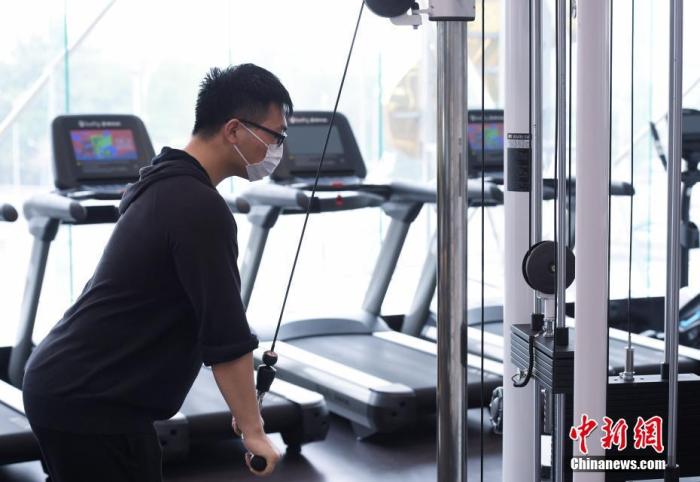
Data Map: A citizen exercises in a gym in Tengda Building, Haidian District, Beijing. Xinhua News Agency reporter Hou Yushe
Compared with impulsive consumers, many consumers do have fitness needs, and they also have the financial ability to afford higher fitness costs. However, when these consumers want to terminate the service for various reasons, they will also fall into a consumer dispute that "it is easy to get a card but difficult to return it".
Xiao Wang, an office white-collar worker, once spent 9500 yuan to buy a two-year fitness card. Soon after, he moved to a residence far away from the gym, and the fitness card and the once ambitious fitness plan were therefore "shelved".
When Xiao Wang negotiated a refund with the gym, he was rejected by the merchant as "no refund for personal reasons". In the end, he had to transfer the fitness card that cost nearly 10,000 yuan on the second-hand platform at the price of "fracture".
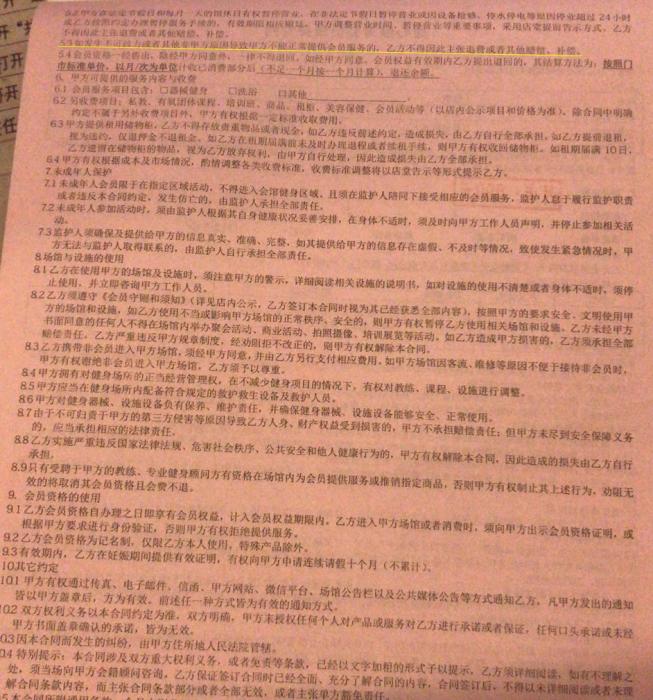
The contract text provided by a gym to reporters.
In the contract that Xiao Wang signed with the gym at the beginning, there were indeed "no refund" and other related clauses.
This kind of experience not only happened to Xiao Wang personally. The reporter opened a second-hand trading platform, entered "fitness card" in the search bar, and instantly jumped out of a number of messages about transferring fitness cards at low prices.

The above price is 40% off and 30% off. Thousands of fitness cards can only be sold at a price of several hundred yuan. Few people are interested, and there are countless sad stories behind how many consumers are wrangling with the gym and finally forced to give in.
Among them, the reasons for the transfer are the change of work and residence, and there are also cases of giving up because of the fading enthusiasm for fitness. Ma Xiao, who lives in Chaoyang District, Beijing, belongs to the latter.
According to his own words, "how heroic I used to be when I applied for a fitness card and a fitness course, and now I have to transfer myself."
I wanted to listen to the beautiful prospect planned by the fitness instructor at the beginning. As soon as Ma Xiao got hot, he immediately bought 60 private lessons at a price close to 20,000. For him who is still a working class, the money can only be repaid monthly by credit card installment.
Contrary to expectations, Ma Xiao’s pace of going to the gym became heavier every time, and eventually he became a guerrilla war with the fitness instructor again and again. It was more difficult to make up the reasons for skipping classes than to ask for leave from work.

In the end, Ma Xiao put his fitness card and private lessons on the second-hand trading platform and transferred them for less than 5,000 yuan. However, when the credit card reminds him of repayment every month, it can always remind him of this fitness course of "chicken flying dog jumping".
According to the reporter’s understanding, there is no uniform form of membership service contracts in most gyms on the market at present, but most of them contain unreasonable regulations such as no card refund and no fee refund.
Even in a gym contract interviewed by the reporter, it is clearly stated that even if force majeure occurs, consumers may not claim refund or other compensation or compensation.
"It is difficult to refund cards and fees" has always been the pain point and difficulty of prepaid consumption in the fitness industry. During the epidemic, individual businesses closed their doors and ran away, causing collective complaints from consumers, further intensifying the contradiction between gyms and consumers. In the long run, it will inevitably reduce consumers’ enthusiasm for the fitness industry and their willingness to spend.
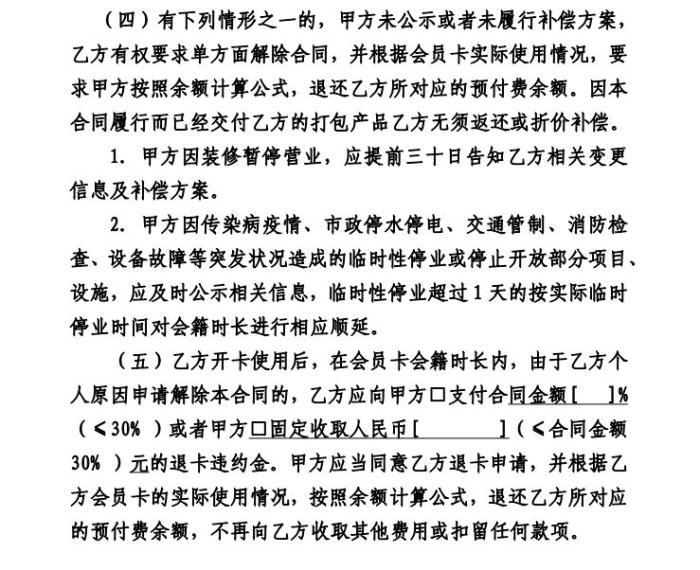
Screenshot of Shanghai Sports Fitness Industry Member Service Contract Model Text.
The "Model Contract (Draft for Comment)" formulated by Shanghai has also made detailed provisions on the liability for breach of contract and termination of the contract.
In view of the member’s voluntary application to terminate the normal performance contract, within the membership period of the membership card, the consumer can get back the prepaid balance after paying a certain amount of liquidated damages according to the balance calculation formula.
Whether it is the "7-day cooling-off period" or "card refund", it not only protects the rights and interests of consumers, but also promotes the healthy development of the fitness industry.
Predictably, the traditional business model with selling membership cards as the main source of profit is no longer suitable for the current fitness market. The rise of new fitness clubs and family fitness has put forward higher requirements for the operation of traditional gyms.
In the final analysis, the gym is also a kind of service industry. Instead of trying to sell cards, we should try our best to provide customers with high-quality and diversified services and build the core competitiveness of the brand.